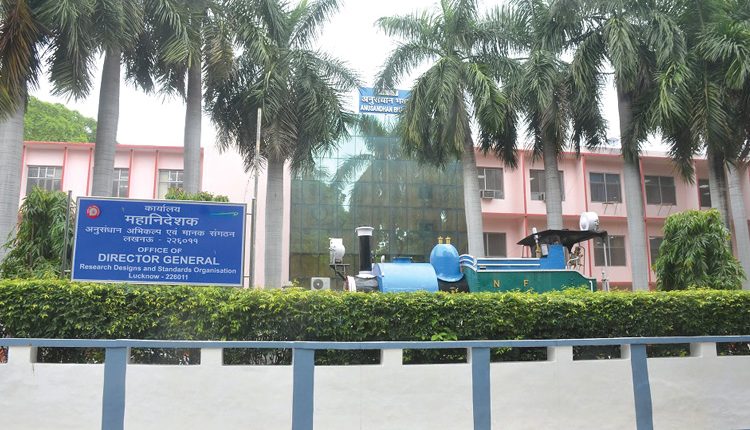Railways came into being in India in 1853 and as their development progressed through to the twentieth century, several companies managed and systems grew up. To enforce standardization and co-ordination amongst various railway systems, the Indian Railway Conference Association (IRCA) was set up in 1903, followed by the Central Standards Office (CSO) set up at Shimla in 1930, for preparation of designs, standards and specifications. However, till independence, most of the designs and manufacture of railway equipment was entrusted to foreign consultants. With Independence and the resultant phenomenal increase in country’s industrial and economic activity, which stepped up the demand of rail transportation, a new organisation called Railway Testing and Research Centre (RTRC) was set up in 1952 at Lucknow, for testing and conducting applied research for development of railway rolling stock, permanent way, etc.
Central Standards Office (CSO) and the Railway Testing and Research Centre (RTRC) were integrated into a single unit named Research Designs and Standards Organisation (RDSO) in at Lucknow in1957, under the Ministry of Railways .
The status of RDSO has been changed from an ’Attached Office’ to ’Zonal Railway’ since 1st January 2003.
RDSO is headed by Director General assisted by Special Director General (Engineering), Special Director General (Vendor Development), Special Director General (S&T), Additional Director General & Principal Executive Director heads of seven verticals incharge of Administration, Rolling Stock, Infrastructure, Traction & Power Supply, Signalling & Telecommunication, Resource & Testing and Traffic & Psycho-Tech directorate.
All the Verticals/Directorates of RDSO are located at Lucknow. The Design Cells for Railway Production Units and Industries, which look after liaison, inspection and development work, are located at Bangalore, Bhopal, Mumbai, Kolkata, Jaipur, Hyderabad and New Delhi.
The Vision of RDSO
The vision of RDSO is To develop safe, modern and cost effective Railway technology complying with Statutory and Regulatory requirements, through excellence in Research, Designs and Standards and Continual improvements in Quality Management System to cater to growing demand of passenger and freight traffic on the railways.
Technical Advisor to the Railway Board
RDSO is the sole R&D organisation of Indian Railways and functions as the technical advisor to Railway Board, Zonal Railways and Production Units and performs the following important functions :
- Development of new and improved designs.
- Development, adoption, and absorption of new technologies for use on Indian Railways.
- Development of standards for materials and products specially needed by Indian Railways.
- Technical investigation, statutory clearances, testing and providing consultancy services.
- Inspection of critical and safety items of rolling stock, locomotives, signalling & telecommunication equipment and track components.
- RDSO’s multifarious activities have also attracted attention of railway and non-railway organisations in India and abroad.
Governing Council
Governing Council comprises Chairman, Railway Board as Chairman and Financial Commissioner, Member (Infrastructure), Member (Traction & Rolling Stock), DG Staff, Member (Operation & Business Development), Addl. Members (Plg) and DG/RDSO as members and Executive Director E&R/Railway Board as Member Secretary. The functions of Governing Council are:
- To identify and approve the R&D projects for technology development on Indian Railways.
- To review the progress of projects.
- To determine the quantum of direct investment in technology development within the overall allocation of funds under the plan head ’Railway Research’.
- To give direction for improving the working of RDSO.
Central Board of Railway Research
Central Board of Railway Research (CBRR) consists of DG/RDSO as Chairman, Addl. Member (Civil Engg.), Addl. Member (Mechanical Engg.), Addl. Member (Elect.), Addl. Member (Sig), Addl. Member (traffic), Addl. Member (Finance), Adviser (Infra.), Executive Director (E&R), Executive Director (Plg.)/Railway Board as members and Addl. Director General/RDSO as member secretary. Non- Railways members of CBRR consist of eminent scientists, technologists, engineers and senior executives of other research organisations, academic institutions and industrial units related to railway technology and materials. Functions of CBRR are:
- To consider and recommend the programme of research on Indian Railways.
- To review the research programme from time to time.
- To ensure coordination and assistance from other research laboratories.
- To review the ongoing projects from the technical angle.
Recent Milestones & Achievements
- Reorganization and restructuring of RDSO was carried out in line with the reorganization of Railway Board.
- RDSO Design inputs were used in the development of Vande Bharat 2.0 Train Set.
- Train Collision Avoidance system (KAVACH) of Phase-II was developed
- Design and Specifications development of Hydrogen fuel cell based 1600 HP DEMU Train took place.
- RDSO developed designs of Power Cars with underslung DA sets.
- A Design Automation Tool for Electronic Interlocking was developed in close cooperation with CRR at IIT Kharagpur.
- Development of Fibre Bragg Grating (FBG) Based WILD System was carried out with Industry academia Partnership and a joint patent was filed.
- An Anti-Viral System in AC Coaches was designed for trains through collaboration with CSIR
- A Compendium for Road Over Bridges (ROBs) on Indian Railways crossings was issued
- A new Design of Foot Over Bridges ( FOBs) with Tubular Section with considerable weight reduction was developed.
- Design of Longest Ever Road Over Bridge ( ROB) of 102m was undertaken at RDSO
- Design of Towers and Monopoles for Indigenously developed Train Protection System TCAS was completed
- Development of Track components viz. Canted turnouts and Weldable Cast Manganese Steel (CMS) crossings
- Procurement and commissioning of Track Recording Cars for Integrated Track Monitoring system (ITMS) was done for the first time
- Design and development of ACT-I Wagons for Auto car (SUV) carrier was completed
- Development of Roll on Roll off (RO-RO) Wagon
- Indian Railway Schedule of Dimension (IRSOD)(BG) 2004 was revised
- Research Studies in Traffic & Psycho-Technical areas of Analysis of SPAD and intervention techniques’ & ‘Customer Service Review’ of Vande Bharat Express were carried out.



